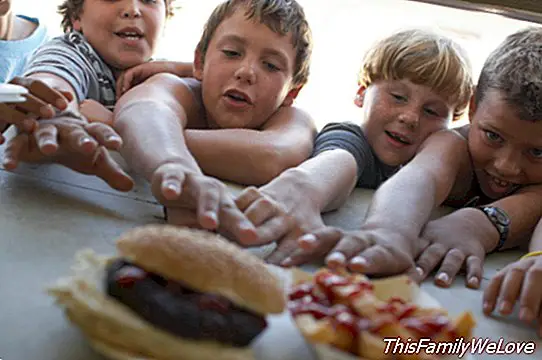Everything you need to know about cholesterol in children
Being healthy is very important in adults, but even more in children, who have so much time left in front of them. Many doctors and experts warn about the need to avoid obesity in children following a healthy lifestyle habits. Today we respond to the possible doubts of parents about cholesterol in children.
ANDl cholesterol is "a fatty substance that is part of most cell membranes and various hormones", explain the experts of the Spanish Association of Pediatrics in Primary Care (Aeped), which clarify that, therefore, cholesterol It is necessary for our body.
Yes, It is our body that makes all the cholesterol you need to stay healthy: "approximately 1000 milligrams a day"At this point, they say that cholesterol also comes from the food we eat, which means that our body can produce more cholesterol than it needs, especially if we eat foods with a high content of saturated fat, trans fat and cholesterol.
However, What are those fats? Saturated "are mainly found in animal fats, such as meat, cheese, whole milk and butter, but also in some vegetable fats, such as palm oil and coconut oil," explain the pediatricians. For its part, trans fats are found in vegetable shortening, margarine, fried foods, pre-cooked, sweet cookies and baking, cakes and pastries.
Cholesterol in childhood
Pediatricians say that most of the time high cholesterol (ie, hypercholesterolemia) is a consequence of environmental factors: "diet with excess saturated fats and cholesterol, inactivity, obesity and tobacco (in the case of adolescents. "This means that diet" is the main environmental risk factor "and, therefore, modifiable of cholesterol levels.
Also, these experts say that there is a small percentage of children who have secondary hypercholesterolemia: one that appears as a result of a basic disease (diabetes, nephrotic syndrome, hypothyroidism, obesity) or a hereditary disease of cholesterol: familial hyperlipaemia, which is transmitted to the entire cause.

Good cholesterol and bad cholesterol
Many times we hear about the good and bad cholesterol. In fact, at the beginning of this article we have told that cholesterol is formed in our body and is necessary. On this, pediatricians clarify that cholesterol is formed in the liver and travels through the body associated with proteins to reach the parts of the body where necessary. The cholesterol junctions with these proteins is calledn lipoproteins.
"Low density lipoproteins or LDL cholesterol are the so-called" bad cholesterol ", because they are the main transporters of cholesterol through the blood vessels, from the liver to the rest of the body, "detail the pediatricians, who point out that if there is a lot of LDL cholesterol in the blood" it can accumulate in the walls of the arteries, forming plaques thick and hard that can clog arteries and cause a decrease in blood flow to that organ, which if the heart can cause a myocardial infarction and if it is the brain, stroke or stroke (stroke). "In summary: "If LDL cholesterol is high, the risk of cardiovascular disease increases."
On the other hand, the high-density lipoprotein or HDL cholesterol, the so-called "good cholesterol". These lipoproteins "carry cholesterol from the cells to the liver, where it is metabolized and eliminated from the body." That is, "having high HDL cholesterol protects the body", they detail, while concluding that total blood cholesterol is the sum of the cholesterol transported in LDL, HDL particles and the content of other lipoproteins.

Is high cholesterol worrying in childhood and adolescence?
Of course: already in childhood high cholesterol can be started, which is "one of the main predisposing factors to develop cardiovascular diseases, such as myocardial infarction or cerebrovascular accidents, through the formation of atheromatous plaques that obstruct, over the years, the blood vessels."
In this regard, pediatricians say that, although it is true that these diseases associated with high cholesterol are not seen during childhood, "They can appear at the beginning of adult life, especially in those with a family history of hypercholesterolemia or premature heart disease. "In addition, they say that it has been seen that half of children with high cholesterol will continue to have high levels when they reach adults.
So, should I do a cholesterol test on the children?
With everything, it is not necessary to make cholesterol analysis to all children. Pediatricians only recommend it when there is an increased risk of having high cholesterol: "children with a history of hypercholesterolemia or cardiovascular problems in the family or who have a disease that is associated with increased cholesterol such as hypothyroidism, obesity, hypertension or diabetes. "
This is because it is possible that a child suffers from genetic hypercholesterolemia when his parents or grandparents suffered cardiovascular disease before age 55, in men, or before 65 in women, or if one of the parents has a cholesterol greater than 240 mg / dl.
"The determination of blood cholesterolRoutinely, all children and adolescents do not identify those who have an increased risk of developing cardiovascular disease, "the pediatricians say to answer this question, which is clear: it must be the child's doctor who advise if it is convenient or not to carry out the analysis.
What cholesterol levels are considered high in children?
"Keep in mind that cholesterol levels in childhood vary depending on sex, age and ethnicity ", explain pediatricians to justify that it is difficult to establish which is the most appropriate test for the diagnosis of hypercholesterolemia in children. All in all, they point out that levels in high limits are considered a total cholesterol of 170 to 199 mg / dl or an LDL cholesterol of 110 to 129 mg / dl.
In the case where children have familial hyperlipidemia, treatment with medications (statins) is safe and effective. However, it is only in them when drug treatment is indicated: "in children and young people with high cholesterol, but without data of familial hyperlipemia, there is no clear evidence of the effectiveness of drug treatment ", they stress, insisting that the treatment decision must be made individually.
What to do if a child has high cholesterol?
If you find out that your son has high cholesterol lor more important is iIntroduce changes in your life habits to reduce the chances of developing heart disease later. "It may be advisable to make changes in diet and physical activity, improving the lifestyle of the whole family, which is the key to maintaining the health of children and adults," point out the pediatricians, who point to these measures as the most effective in daily life:
1.- Consume dailye fruits, vegetables, cereals preferably wholegrain and legumes. At least 5 daily servings of fruits and vegetables are recommended.
2.- Decrease meat rich in fat, substituting it for lean meat and preferably for birds (without skin) and rabbit.
3.- Avoid viscera (liver, heart, kidneys, brains ...), sausages, pre-cooked foods and industrial pastries.
4.- Increase the fish consumption. White fish and especially blue fish (sardines, trout, tuna, mackerel, salmon ...).
5.- Choose dairy products and derivatives, preferably with low fat (semi-skimmed and skimmed).
6.- Cooking with olive oil, avoiding other fats like butter, margarine, bacon ...
7.- Instead of fried, use cooking with low fat as boil, roast in the oven, steamed, grilled and grilled.
8.- Decrease the consumption of sugary drinks and the contribution of salt.
9.- Perform physical activity on a regular basis (Exercise is recommended 30 to 60 minutes a day, preferably every day of the week) and decrease the time spent on sedentary activities (such as TV, computer and video game consoles). To remember: exercise increases the "good cholesterol".
10.- Keep a Healthy weight. You have to control the weight in case of overweight or obesity.
11.- Before putting anything in the shopping cart, you have to read the nutritional information labels of the food to choose those with low content in saturated fats, trans fats and cholesterol. Saturated fats in the diet should not exceed 10% of the total calories consumed, trans fats less than 2% of total calories and dietary cholesterol less than 300 mg / day.
Angela R. Bonachera




